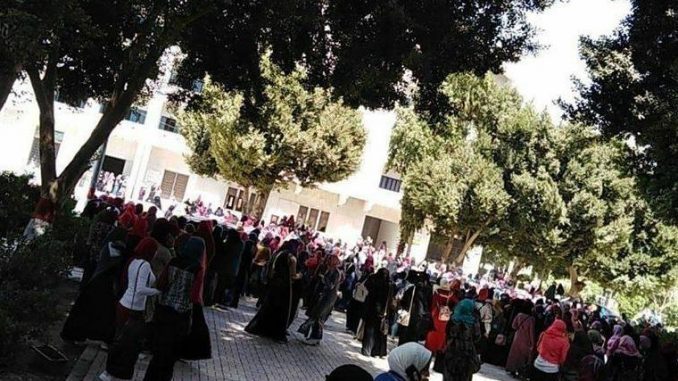
Hundreds of female students at Egypt’s Al-Azhar University held a protest yesterday, accusing college officials of attempting to cover up the rape of a woman on campus the week before.
Screams were heard at a nearby park within the Assuit university compound at 6pm on 18 March when a student from the Arabic Language Faculty was assaulted and raped. Found with her clothes ripped and bloodied, she was quickly taken to hospital by fellow students, but died from a severe haemorrhage caused by her injuries.
The attacker was seen to have escaped by climbing over the compound wall, but in the aftermath of the student’s death, university authorities denied that the incident had taken place. University officials claimed that the girl had travelled home for a holiday with her parents, despite eyewitness accounts to the contrary.
“The [Al-Azhar Media] centre has noticed that some of the social networking pages of anonymous stories about the incident … all containing false lies, without any specific facts that can be referred to, but only spreads confusion and panic among the students of Al-Azhar,” the university said in a press release.
Officials later banned discussion of the assault, with a voice recording allegedly of Al-Azhar Vice President Osama Al-Raouf threatening students with dismissal and further legal action if they published any “rumors” about the incident on social media.
In response, students organized a demonstration calling for the university to acknowledge the incident, the housing administration to be held responsible for its negligence, and investigate the case to locate the perpetrator. Using the hashtag “The rights of student at Al-Azhar University”, they shared videos and photos of the demonstration on social media.
However, in attempting to leave the campus, the protesters found themselves surrounded by security forces, who called on them to end the rally.
Videos from the protest show the women peacefully chanting, but security forces later closing the gates to the compound, accusing them of inciting others to protest. Two students are believed to have been detained in the demonstrations after testifying to having witnessed the assault.
Sexual assault has been identified as a persistent problem in Egypt; a 2017 report from the UN Women and Promundo found that some 60 per cent of women said they had been victims of some form of sexual harassment during their lifetimes.
However last August, Al-Azhar University issued a statement denouncing sexual abuse against women and calling for anti-harassment laws to be used to punish perpetrators.
“The holy Al-Azhar asserts that criminalizing harassment must be absolute regardless of the context or conditions,” the statement read. “Blaming harassment on a woman’s clothing or behavior is a wrong way of thinking. Harassment is an attack on a woman’s privacy as well as her dignity and freedom. This appalling phenomenon also leads to the loss of the sense of security.”
Initiatives to tackle sexual harassment in the country have also proven futile; in November an experiment conducted by grassroots media outlet Egyptian Streets found that approximately 95 per cent of calls made to a hotline dedicated to victims of sexual harassment in Egypt were ignored.
The president of the National Council of Women (NCW) which advertised the hotline had previously claimed that the rate of sexual harassment in Egypt was only 9.6 per cent in 2016, adding that 99 per cent of reports of abuse by women were invented.



